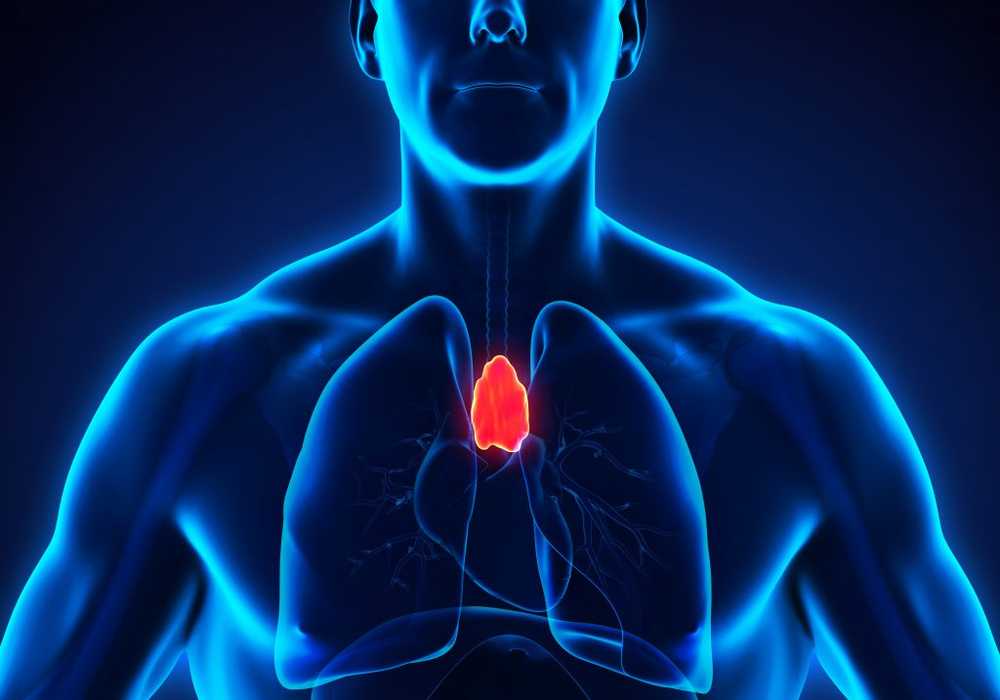Cancer Research A heat shock protein with significant influence on thymic tumors

So-called heat shock proteins are essential for the survival of human cells at elevated temperature loads, but also in other extreme conditions. According to the latest study results of researchers from the Medical University of Vienna (MedUni Vienna), heat shock proteins could also serve as biomarkers for thymic tumors (thymomas and thymus carcinomas) and thus be used in future for the early diagnosis. On the basis of the findings, it is also possible to develop targeted therapies for patients in whom a tumor operation is not possible, so the scientists hope.
In their current study, the scientists of the MedUni Vienna have investigated "the role heat-shock proteins play in the formation of tumors on the thymus," according to the University. According to their results, heat shock proteins in tumors show a prognostic relevance in tumors of the thymus gland. They are promising tumor markers for thymomas and could be used in the future for patients, in which a tumor operation is excluded, for targeted cancer therapies, explains study author Stefan Janik. Together with the thoracic surgeons Bernhard Moser, Hendrik Jan Ankersmit and Walter Klepetko, as well as the pathologist Ana-Iris Schiefer and the pathologist Leonhard Müllauer, Janik had analyzed the importance of heat shock proteins in tumor formation. Their results were published in the scientific journal "Scientific Reports".
 The thymus gland undergoes degenerative processes over the course of its life, which may lead to tumor formation. (Image: nerthuz / fotolia.com)
The thymus gland undergoes degenerative processes over the course of its life, which may lead to tumor formation. (Image: nerthuz / fotolia.com) Degenerative processes in the thymus gland
According to the researchers, the human thymus gland is a hitherto relatively unknown organ located in the rib cage between the sternum and the heart. In it, T cells are formed, "which serve for specific immune defense and are crucial for the immune system," reports MedUni Vienna. The development of T-cells occurs especially in the first ten years of life and then it comes to the regression of the thymus gland. Their tissue is increasingly replaced by fat and the gland loses its function. In the course of this degenerative process, thymus tumors (thymomas and thymus carcinomas) can form, with the possible causes and risk factors still unclear, the researchers explain. Every year, around 30 such cases are treated at the Department of Thoracic Surgery of MedUni Vienna. The treatment usually provides for surgical removal of the tumor or thymus (thymectomy).
Thymus tumors are often discovered "by chance"
In their study, the researchers evaluated data from 125 patients who underwent a thymectomy at the MedUni Vienna from 1999 to 2014. In many cases, the finding was incidentally made in the context of an imaging examination for other reasons, or in connection with the diagnosis of myasthenia gravis, a neurological autoimmune disease leading to muscle weakness. In general, around one-tenth of the patients with "myasthenia gravis" also have a thymus tumor, which usually results in surgical removal. The scientists studied the changes in the levels of heat shock proteins in the subjects after the thymectomy.
Promising tumor marker and new therapeutic approaches
According to the MedUni Vienna, the heat shock proteins or even "stress proteins" are formed "when cells are exposed to elevated temperature or other stress factors." Infections should also be counted for this. The heat shock proteins stabilize cellular processes, allowing cells to survive in difficult conditions. However, tumor cells also use the proteins for the formation of metastases and for the development of resistance to chemotherapy, reports MedUni Vienna. The researchers were able to prove in their study that the protein levels in the blood of those affected after a complete tumor removal significantly decrease and that heat shock proteins in tumors have a prognostic relevance. According to Stefan Janik, the heat shock proteins are a promising tumor marker "and could be used in the future for patients who can not undergo tumor surgery for targeted cancer therapies". (Fp)


